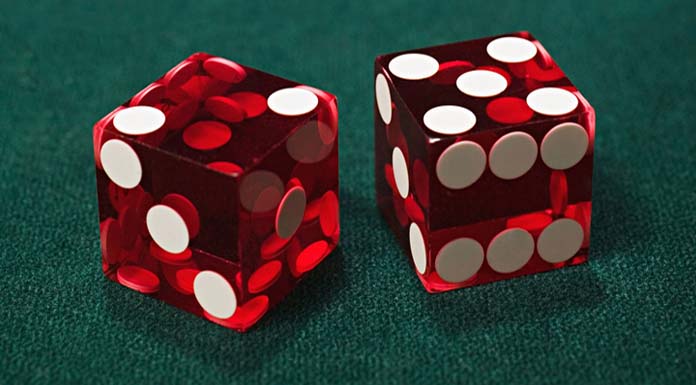Dominic Loriggio
Dominic LoRiggio is The Man with the Golden Arm or The Dice Dominator. LoRiggio was raised in the United States where he studied and worked as office clerks in the office. But he altered his profession and life, paving the way to win at craps. His gambling career started as a card counter in the late 1980s. Dominic LoRiggio, better known as “The Man with the Golden Arm” developed the technique of rolling the dice at craps in a manner that would reap him desired results. He used this method to make big wins at several casinos. He conducts classes for those interested in learning his technique to win thousands of dollars at casinos. Craps tips by Dom Loriggio provide information on how to be a better player, utilize dice control techniques and more! Articles are added monthly, so check back for the latest updates.
By simple definition, a “streak” is a consecutive series of similar outcomes. It applies to everyday occurrences from a spell of rainy days or cold temperatures to scoring or failing to score in game after game in sports as well as unbroken periods of gains or losses on the stock market. Streaks can be long or short. They may have easily identifiable sources or arise mysteriously without apparent cause. And although it’s often hard to know exactly when a streak has begun, it is always quite easy to recognize one after it has occurred.

In casino games, streaks come in two basic forms: winning and losing. On average, over long periods of time and all else being equal, they tend to cancel each other out. That’s one of the hallmarks of a “fair game,” which is defined in greater detail on this web site in the section on Expected Value.
The concept of “streakiness” arises when a “streak of streaks” seems to occur. In a game of flipping coins, for example, a long series of repeated heads might be followed by a short streak of tails, then another long series of heads, etc. Casino game players often complain in Internet message boards about the streakiness of online gambling software. Many believe streakiness is an indication of an unfair game. But is that really the case, or is it actually something else entirely?
The Mathematics of Streaks

Casino games are structured to give a slight advantage to the House, meaning players are expected to lose a certain percentage of their wagers over time. In the long term, this is certainly true, but during a single session of play, the results can be dramatically different. A player may go on a winning steak where it appears impossible to lose. Such was the case at a Craps table in Canada in 2005, when Dominic LoRiggio became the first known shooter in history to throw the dice 56 times without a seven showing.
Dominic Loriggio Craps
Some might argue that LoRiggio cheated or that he was a “mechanic” who knew how to hold and throw the dice so precisely that he could control the outcome. However, the mathematics of Craps indicates that a random streak of 56 non-seven rolls, even if highly unlikely, is well within the realm of probability.
How do we know that? Out of 36 possible outcomes when rolling two dice, 30 of them are not totals of seven. That means the odds of rolling a non-seven are 30 in 36 or 5/6. The probability (P) of throwing non-sevens for an “n” number of times is exactly P = (5/6)n. Applying the formula to LoRiggio’s 56 rolls, his feat could be expected to occur with a frequency of (5/6)56 = 0.0000364 or 0.00364%—highly unlikely, but quantifiable.

What about much shorter streaks then? How often do they occur? Again, using Craps as the example and defining a “streak” as a consecutive series of at least four non-seven rolls, a streak can be expected to occur with a frequency of P = (5/6)4 = 0.4827. That’s 48.27% or roughly half of all hands—which may be often enough to suggest to some that Craps is a “streaky” game.

Dominic Loriggio Wikipedia
All Games Exhibit Streakiness

Similar math can be applied to European Roulette. What are the chances that a Red number will be spun four times in a row? It is the odds of a single occurrence, 18 in 37, raised to the power of four—(18/37)4 = 0.056—or a little more than one in 20 series of spins. Of course, the same is true for Black numbers, so these streaks of either color can be expected about once in every ten series, making Roulette appear to be rather streaky, too. Other casino games, including Baccarat and Blackjack, display similar streakiness.
Why is this so? It is because wins, losses, ties, streaks and streakiness all occur with mathematical precision over the long term, following what is called the “Law of Large Numbers.” The law states that “the average of the results obtained from a large number of trials should be close to the Expected Value, and will tend to become closer as more trials are performed.” At some point, streaks must occur.
Golden Touch Craps
On the other hand, the “Law of Small Numbers” takes precedent in the short term. The law states that “the average of the results obtained from a small number of trials may differ greatly from the Expected Value, and will tend to become even more discrepant if fewer trials are performed.” When the sample size is mathematically insignificant, such as a series of four numbers in a row at Roulette or 56 rolls at Craps, players may be tempted to make a hasty generalization that the game runs in streaks or not, even though they are observing a tiny segment of all outcomes and just one anticipated case of a very normal distribution of results. As it happens, players are more likely to notice and remember streaky sessions than “normal” ones, too.
Dominic Loriggio Net Worth
The bottom line is that all casino games are streaky at times. Streaks occur naturally and with mathematical inevitability. They should be expected and prepared for. Players who are observant and quickly realize that a streak is in progress can greatly benefit by wagering accordingly, betting big during winning streaks and leaving the table during losing ones.